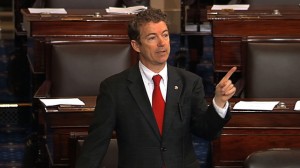
Weekly Standard editor Bill Kristol appearing on Fox News on November 24, 2001, in a scene from Buying the War, Bill Moyers's documentary on the media's cheerleading role in the months leading up to the Iraq War.
Indeed, during year one of the new presidency, Republicans, despite their campaign to sink the Obama agenda in every other area, still sided with the Kristol camp when it came to foreign policy. In July 2010, the House of Representatives voted to approve funding for Obama’s troop surge in Afghanistan, with 102 Democratic defectors and only 12 Republicans voting against. In fact, more Republicans supported Obama’s policy (160) than Democrats (148). By all indications, the neoconservative hold on the Republican Party was strong.
In 2011, that started to change, when dovish Republicans like Senator Rand Paul (R-KY) and Rep. Justin Amash (R-MI) took office. In his foreign policy coming-out speech at Johns Hopkins University, Paul said he would “rather send some…professors around the world than I would our soldiers” and would “rather do that than go to war with Iran.” In May, 26 Republicans voted for an amendment by Rep. Jim McGovern (D-MA) to implement a timetable for withdrawal from Afghanistan that only narrowly failed. Later that year, 225 House Republicans joined 70 Democrats to reject authorizing military action in Libya after hostilities began.

This video frame grab provided by Senate Television shows Sen. Rand Paul, R-Ky. speaking on the floor of the Senate on Capitol Hill in Washington, Wednesday, March 6, 2013. (AP Photo/Senate Television)
Flashing forward a few months, the resurgence of paleoconservative and libertarian Republicans turned to a new target: the surveillance state. Led by upstart Amash, 94 House Republicans voted with 111 House Democrats for a narrowly defeated amendment to restrain the NSA’s mass surveillance powers. Included among them were hardcore hawks like Rep. Jack Kingston (R-GA), who had previously defended the Iraq invasion as having “transformed” that country from “a dictatorship” to a country “that practices the rule of law.” Another former hawk, Rep. Jim Sensenbrenner (R-WI), also voted for Amash’s amendment – a remarkable switch from his position in 2001, when he authored the USA PATRIOT Act.
Kristol’s camp has been visibly shaken by the Republican defections on national security. “National security is different from internal matters of the government,” he told a Fox News host, defending the NSA. “We’re dealing with foreign threats here.” Meanwhile, Sen. John McCain (R-AZ), one of the major Republicans still allied with the hawks, famously derided Amash and Senator Paul as “wacko birds” after the latter’s filibuster. Rep. Peter King (R-NY), a leading Islamophobe among the Republican coalition, chimed in saying it was “disgraceful that so many Republicans voted to defund the NSA program.”
It is in this climate of neoconservative decline that we face the upcoming possible vote on Syria military action resolutions – which has been indefinitely delayed due to the recent potential diplomatic breakthrough. Although no vote has yet taken place, it is expected to be a massive defeat for neoconservatives like Kristol and others who have been urging Obama to strike Syria. At the end of August, Kristol’s Weekly Standard published a letter of “foreign policy experts” – largely American neoconservatives like Kristol and Elliot Abrams – urging President Obama to intervene in the Syrian civil war. The letter seemed perhaps more persuasive with the Obama administration than with the congressional Republicans these pundits traditionally influenced.
There are a number of press outlets keeping whip counts on the Syria resolutions; the House is leaning overwhelmingly against. The Washington Post’s count shows 140 representatives against military action, with an additional 111 leaning no. Undecideds are at 156, and 26 are for military action. Of those 26, only 8 are Republicans, meaning more than twice as many Democrats are firmly in favor of military action than Democrats.
Additionally, the largest group of grassroots activists on the right – the tea party – have joined with progressives to oppose military action. The New York Times writes of a tea party group in Kentucky that has started to attend peace vigils:
At the regular Peace Vigil in Louisville, Ky., on Sunday, some unusual newcomers joined the bearded, longtime war protesters waving signs with doves and “War Is Not the Answer”: a contingent from Indiana’s Clark County Tea Party Patriots, who came to oppose military intervention in Syria.
“Our bombs aren’t any better than the chemical weapons the Syrians are lobbing,” said Kelly Khuri, a leader of the Tea Party group, who was nonplused at the first protest she attended a week earlier to be linking arms with the progressive left. “It kind of freaked me out,” she said.
It’s fair to ask how much of the growing Republican opposition to war and the national security state is based on sincere beliefs and how much of it is simply a reaction to having a Democrat in the White House. But virtually everything in American politics is at least somewhat a reflection of partisan politics. Notice, for example, how Minority Leader Nancy Pelosi (D-CA) has been completely dismissive of civil liberties concerns under Obama, but was outraged under the former president. And as previously mentioned, there are still a significant number of Republicans continuing to support hawkish policies, an indication of a real split within the party that goes beyond partisanship.
In a clear shot across the bow, New Jersey’s Republican governor Chris Christie called the Rand Paul wing of the party “very dangerous,” setting off a war of words with his likely future presidential rival. Yet even Christie understood the changing winds in the party; when asked about Syria, he said, “I’m going to leave that to the people who represent us in Congress.”
As that Congress lines up to possibly take votes on military action in Syria, the changing party will likely be on the minds of many, from rising stars Paul and Amash to establishment figures like Senate Minority Leader Mitch McConnell (R-KY), whose re-election campaign is being managed by Jesse Benton, former presidential campaign manager to Rand Paul’s father, Ron, who share’s his son’s anti-interventionist sentiments.
Where this insurgency ends is unclear but the Republican Party’s neoconservative hawks may no longer rule the roost.


